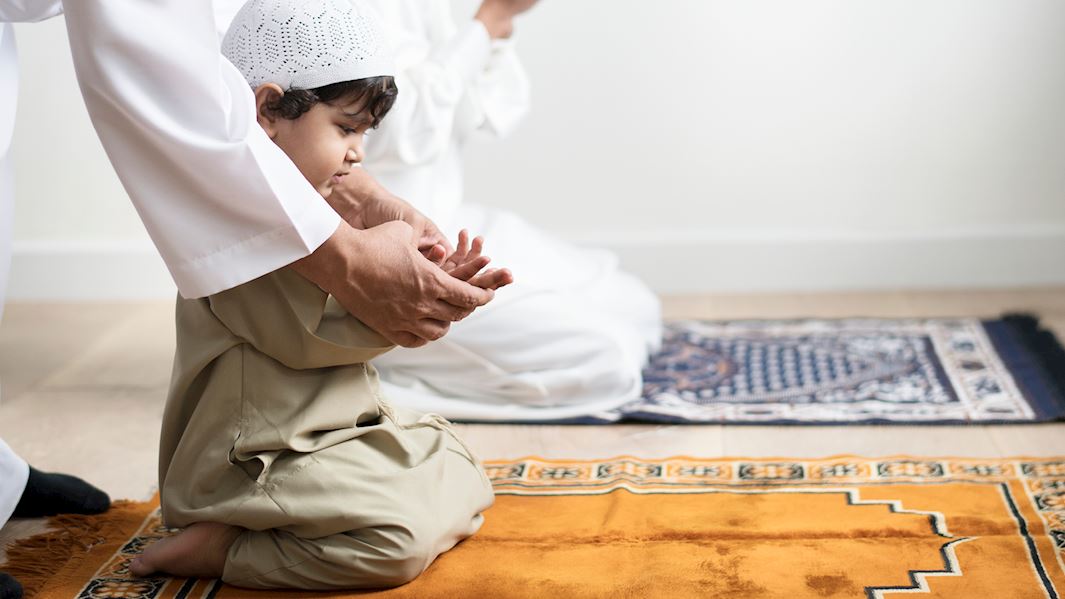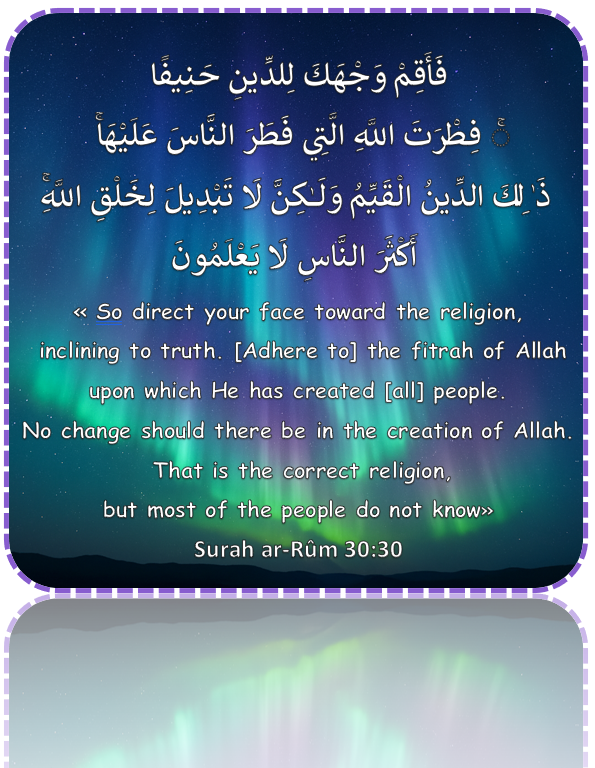Matters of the heart
Tawḥīd as a Mercy from Allah and Fitrah
I. Qur’ān Verses on Tawḥīd as a Mercy and Fitrah
1. Fitrah – Innate Tawḥīd
فَأَقِمْ وَجْهَكَ لِلدِّينِ حَنِيفًاۚ فِطْرَتَ اللَّهِ الَّتِي فَطَرَ النَّاسَ عَلَيْهَاۚ لَا تَبْدِيلَ لِخَلْقِ اللَّهِۚ ذَٰلِكَ الدِّينُ الْقَيِّمُ وَلَٰكِنَّ أَكْثَرَ النَّاسِ لَا يَعْلَمُونَ
« So set your face toward the religion, inclining to truth. [Adhere to] the fitrah of Allah upon which He has created people. No change should there be in the creation of Allah. That is the correct religion, but most people do not know » (Souratear-Rûm 30:30)
![]()
2. The Covenant Before Birth
وَإِذْ أَخَذَ رَبُّكَ مِن بَنِي آدَمَ مِن ظُهُورِهِمْ ذُرِّيَّتَهُمْ وَأَشْهَدَهُمْ عَلَىٰ أَنفُسِهِمْ أَلَسْتُ بِرَبِّكُمْۖ قَالُوا بَلَىٰ شَهِدْنَاۛ أَن تَقُولُوا يَوْمَ الْقِيَامَةِ إِنَّا كُنَّا عَنْ هَٰذَا غَافِلِينَ
« “And [mention] when your Lord took from the children of Adam — from their loins — their descendants and made them testify of themselves, [saying to them], ‘Am I not your Lord?’ They said, ‘Yes, we testify.’ [This] – lest you should say on the Day of Resurrection, ‘Indeed, we were of this unaware.’ » (Surah al-Aʿrāf7:172)
قَالَ رَبِّ بِمَا أَغْوَيْتَنِي لَأُزَيِّنَنَّ لَهُمْ فِي الْأَرْضِ وَلَأُغْوِيَنَّهُمْ أَجْمَعِينَ ﴿٣٩﴾
[Iblees] said, "My Lord, because You have put me in error, I will surely make [disobedience] attractive to them on earth, and I will mislead them all
إِلَّا عِبَادَكَ مِنْهُمُ الْمُخْلَصِينَ﴿٤٠﴾
Except from your servants the sincere ones
Quran Surah 15 Hijr verses 39 40
![]()
1. قُلْ أَمَرَ رَبِّي بِالْقِسْطِ وَأَقِيمُوا وُجُوهَكُمْ عِندَ كُلِّ مَسْجِدٍ وَادْعُوهُ مُخْلِصِينَ لَهُ الدِّينَ كَمَا بَدَأَكُمْ تَعُودُونَ ﴿الأعراف: ﴿٢٩﴾
Say, [O Muhammad], "My Lord has ordered justice and that you maintain yourselves [in worship of Him] at every place [or time] of prostration, and invoke Him, sincere to Him in religion." Just as He originated you, you will return [to life] - Quran Surah 7 Al Araf verse 29
![]()
2. هُوَ الَّذِي يُسَيِّرُكُمْ فِي الْبَرِّ وَالْبَحْرِ حَتَّىٰ إِذَا كُنتُمْ فِي الْفُلْكِ وَجَرَيْنَ بِهِم بِرِيحٍ طَيِّبَةٍ وَفَرِحُوا بِهَا جَاءَتْهَا رِيحٌ عَاصِفٌ وَجَاءَهُمُ الْمَوْجُ مِن كُلِّ مَكَانٍ وَظَنُّوا أَنَّهُمْ أُحِيطَ بِهِمْ دَعَوُا اللَّهَ مُخْلِصِينَ لَهُ الدِّينَ لَئِنْ أَنجَيْتَنَا مِنْ هَـٰذِهِ لَنَكُونَنَّ مِنَ الشَّاكِرِينَ ﴿يونس: ٢٢﴾
It is He who enables you to travel on land and sea until, when you are in ships and they sail with them by a good wind and they rejoice therein, there comes a storm wind and the waves come upon them from everywhere and they assume that they are surrounded, supplicating Allah, sincere to Him in religion, "If You should save us from this, we will surely be among the thankful."
Quran Surah 10 Yunus verse 22
![]()
The Duas of The Prophets and The Pious
Allah SWT Says In The Quran:
وَقَالَ رَبُّكُمُ ادْعُونِي أَسْتَجِبْ لَكُمْ إِنَّ
“Call upon Me, I will respond to you.”
Dua is such an important part of being a believer, that our beloved Prophet PBUH equaled it to worship. That’s why, Allah SWT has given us examples of duas made by the Prophets and pious people PBUT in The Holy Quran.
The Dua of Prophet Adam A.S
This is the first dua ever said by mankind. It was the dua of Prophet Adam A.S when he had committed his first mistake and turned to Allah SWT in repentance. This is a helpful dua to say for istighfar (seeking forgiveness).
رَبَّنَا ظَلَمْنَا أَنفُسَنَا وَإِن لَّمْ تَغْفِرْ لَنَا وَتَرْحَمْنَا لَنَكُونَنَّ مِنَ الْخَاسِرِينَ
Rabbana thalamna anfusana wain lam taghfirlana watarhamna lanakoonanna mina alkhasireena
“Our Lord! We have wronged ourselves. If You forgive us not, and bestow not upon us Your Mercy, we shall certainly be of the losers.” - (Quran 7:23)
The Dua Of Prophet Yunus A.S
This is the dua that was said by Prophet Yunus A.S when he was stuck inside the belly of a whale. He felt hopeless and turned to Allah SWT in repentance, begging for His Mercy. Another wonderful dua to say for istighfar and at times of hardship.
لَّا إِلَهَ إِلَّا أَنتَ سُبْحَانَكَ إِنِّي كُنتُ مِنَ الظَّالِمِينَ
La ilaha illa anta subhanaka innee kuntu mina al thalimeena
“No one has the right to be worshiped but You (O Allah), Glorified (and Exalted) are You. Truly, I have been of the wrong-doers.” - (Qur'an 21:87)
 The Etiquette and Sunnah of Making Du’a
The Etiquette and Sunnah of Making Du’a
The Prophet (saw) said, ‘Du’a is worship itself’. Then the Prophet (saw) recited this verse, ‘Your Lord says:
“Call upon Me and I will respond to you. Verily, those who disdain My worship will enter Hell in humiliation” [The Noble Qur’an, 40:60]’. [Tirmidhi]
As we maximise our worship this Ramadan, du’a is an essential action which we definitely can’t miss out on. This article is a comprehensive guide to making du’a, including the etiquette of preparing for du’a, what your du’a should include and what our attitude towards du’a should be.!
May Allah (swt) accept your du’as and ours, amin!
Visitors Counter
 | Today | 410 |
 | Yesterday | 696 |
 | This_Week | 4400 |
 | This_Month | 14225 |
 | All_Days | 361594 |


